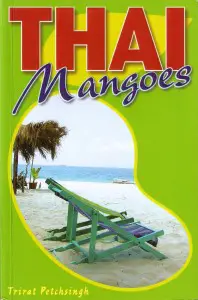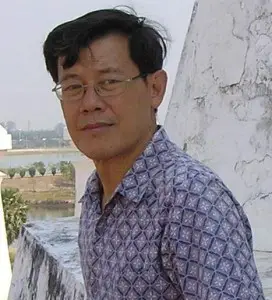 There are very few Thai authors who use the medium of the English language as their primary writing language. Two of the most famous ones are the Eton-educated SP Somtow, author of Jasmine Nights, and the 1990 Nobel Prize for Literature nominee Pira Sudham, author of Monsoon Country. A third author is Trirat Petchsingh, a foreign educated son of a diplomat, who in 2007 had his debut with Thai Mangoes. It is a collection of short stories set in contemporary Thailand published by Bangkok Book House. Although not anywhere close as popular as the first two Thai writers mentioned above, Trirat’s decision to write in English rather than Thai is to be appreciated and his work deserves to be scrutinized.
There are very few Thai authors who use the medium of the English language as their primary writing language. Two of the most famous ones are the Eton-educated SP Somtow, author of Jasmine Nights, and the 1990 Nobel Prize for Literature nominee Pira Sudham, author of Monsoon Country. A third author is Trirat Petchsingh, a foreign educated son of a diplomat, who in 2007 had his debut with Thai Mangoes. It is a collection of short stories set in contemporary Thailand published by Bangkok Book House. Although not anywhere close as popular as the first two Thai writers mentioned above, Trirat’s decision to write in English rather than Thai is to be appreciated and his work deserves to be scrutinized.
The Sacrifice, the piece that opens Thai Mangoes, is an autobiographical short story about the author’s difficult relationship with his late mother. Venturing in the jungles of northern Thailand, somewhere in the vicinity of Chiang Mai, the narrator’s family buys a mine and starts digging for ore in the hope of achieving financial success. Unfortunately, things don’t go as planned and the hardships the Mother had to go through eventually raised the question which ends the story: “was the sacrifice worth it?” Trirat Petchsingh does a good job at describing the mountainous area in the north of Thailand in an evocative manner, while titbits of information on the culture, beliefs and superstitions of the Karen people make the The Sacrifice probably one of the best short stories in the entire collection.
The Chedi is the second short story based in contemporary Chiang Mai, but the narration also takes the reader to a distant past. It is the story of Surasak and how he got to meet his future wife Bua Khan, the one who warns him not to sell his land that housed an ancient chedi. The ending is blanketed in textbook-like nationalism: “I see the chedi as a symbol of all that’s good in our people – a repository of our national culture and heritage, bequeathed to us by our forefathers.”
Rain Clouds is the typical story of the Thai village girls who are exploited from an early age by their families. Sent to work in the city, they eventually end up in massage parlours, “all with nothing but their bodies to sell.” It is also a story about village life in poor Thai communities, highly dependable on the weather to plough, plant and harvest their rice.
The Village Headman is a story about the corruption and vote-buying that goes on even in the most obscure Thai villages. Fortunately, at least in fiction, the good guy wins after the author comes up with some sort of twisted justice.
The Past Catches Up brings some reminiscence of the narrator’s affair while living in Sri Lanka at the age of eighteen. Deciding to dedicate himself totally to writing, upon inheriting a small fortune, the first-person narrator looks into buying a house in Chiang Mai. The main character’s trip to Chiang Mai to see the house he was planning to buy brings back memories (and even more!) of the time he spent in Colombo.
 The Third Encounter is the failed love story of Surachai, a Bangkok man, and Wanphen, a Chiang Mai girl he met in his early adolescence. The third encounter refers to the third time they (almost) met over a long period of time. The short story’s repetitive pattern (the man goes away promising to come back, but he doesn’t really come back) is also reflected in a static narrative. The end suggests a wasted life waiting for the loved one.
The Third Encounter is the failed love story of Surachai, a Bangkok man, and Wanphen, a Chiang Mai girl he met in his early adolescence. The third encounter refers to the third time they (almost) met over a long period of time. The short story’s repetitive pattern (the man goes away promising to come back, but he doesn’t really come back) is also reflected in a static narrative. The end suggests a wasted life waiting for the loved one.
In Metamorphosis we witness the main character’s transformation from a man ready to abandon his wife and daughter, to a man ready to repent for his sins. After Chavalit spent all his life cheating on his wife and neglecting his family, there’s an abundance of sins for him to repent. For him, Bangkok was “a concrete jungle and himself a predator” chasing the next pretty woman to accompany him to the nearest love motel.
Mangoes is the story of a driver who smuggles tin ore from the deep jungles of Chiang Mai. The story offers vivid descriptions of the vegetation of northern Thailand. This short story was also published in New Asian Writing’s anthology The Range of a New Ancestor (2010).
By-Lines deals with Somsak Pornsuwan’s shyness in approaching a fellow journalist, a woman called Amara.
The Two Moons of Vira’s World recalls through the eyes of a recruit the October 6, 1976 carnage, when the Thai army fired live amo into the students who were demonstrating on the streets of Bangkok. It’s an evocative short story, full of the tragedies that both sides (the students’ and the soldiers’) had to go through.
Mr. Cheng’s Silver Coffeepot deals with the common practice of (rich) Thai men to have a mia noi, a second wife, usually much younger than the man himself. This is the case of Mr. Cheng, a successful businessman from Bangkok, who spends his lunch hours with his mistress, “a young northern girl of sixteen.” The title refers to Mr. Cheng’s vision that “the girl’s tiny breasts… were just the size and shape of the lid of the coffee pot at home,” a vision which, towards the end of the story, resurfaces in the most unexpected place. Although it is one of the shortest short stories in the collection, is by far the most riveting one, giving the reader food for thought even after the reader has finished the entire book. This story also opened New Asian Writing’s anthology of short stories Mr. Cheng’s Silver Coffeepot (2012).
The Ducks starts during the Chinese New Year’s Eve when the narrator witnesses the slaying of two ducks. Later on, while intoxicated with a “reefer,” he has a vivid psychedelic experience that involves nudity, death and music.
Trust Me is the story of a most unlikely incident: a farang, named David, promises to marry a poor girl from the north of Thailand, named Suwanee, after knowing her for just one day. The dowry is settled at one million baht and on his return to Bangkok, the trustful farang sends her half the money to start the necessary arrangements for their engagement. The words “trust” is mentioned quite a few times in the short story, but whether the characters lived up to their promises, I’ll leave it to the readers to find out for themselves.
 In Girl on the Bus the reader is made intimate to the interior monologue of a man who rides for three hours on the Petchburi – Bangkok bus. The pretty Thai girl who chose to sit next to him on the empty bus becomes the focus of his thoughts, but Anuwat is too shy and too cautious to approach her.
In Girl on the Bus the reader is made intimate to the interior monologue of a man who rides for three hours on the Petchburi – Bangkok bus. The pretty Thai girl who chose to sit next to him on the empty bus becomes the focus of his thoughts, but Anuwat is too shy and too cautious to approach her.
Mr. Frog is an animal allegory and James is the story of a basset hound and its relationship with the owner, the narrator of the story.
The Celadon Bowl is the story of a Bangkok couple who try to find genuine artifacts in the ancient city of Si Satchanalai in northern Thailand, a place known for the “thriving ceramic industry up until the sixteenth century.”
In Use of Force, the events of the September 2007 coup d’état are paralleled with the story of Surawudh and his unhealthy relationship with a girl from a poor family.
The Rescue, the last short story in the collection, tells the real-life story of a prostitute and the young Samaritan who tries to keep her out of trouble.
Although the quality of the cover is a really pleasant choice, with the word “mangoes” in relief print, it is hard for me to understand why the art department at Bangkok Book House chose a paradisiacal image for the cover from what is suggested to be a Thai island. With very few exceptions, the entire book is set in Bangkok and the north of Thailand. So, the one trip to Bang Saen beach and the short visit to Pattaya, portrayed in just under one paragraph in total, simply do not justify the cover.
Thai Mangoes is Trirat Petchsingh first step on the stage of Thai authors who write fiction in English and we look forward to his future fiction.
A shorter version was initially published in
Bangkok Trader (Vol.4, No.3, February 2010)


I love this story. i see symbol that gives a lesson.